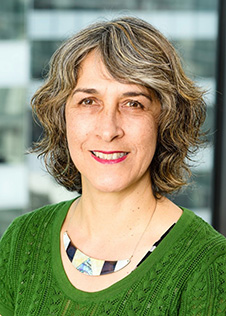Maōri values, systems and ethics must play an integral part if regenerative tourism is to be successfully practised in New Zealand, University of Otago Associate Dean (Māori) Associate Professor Katharina Ruckstuhl says.

Associate Professor Katharina Ruckstuhl.
While delivering the public lecture on the first day of the fourth annual University of Otago Tourism Policy School this afternoon, she drew on Ngāi Tahu cultural narratives and design practice to discuss regenerative approaches to the industry.
Associate Professor Ruckstuhl says we are in the midst of a global breakdown and our habitual ways of being and customary practices have been interrupted.
But with a breakdown, comes space for action and the creation of new domains where new conversations and connections can take place.
Regenerative tourism practices involve having holistic worldviews that transcend conventional and contemporary sustainability practices.
If New Zealand wants thriving regenerative tourism practices, those creating policy and plans will need to embrace sets of beliefs and practices that are unfamiliar to them, including Māori cosmologies, she says.
Associate Professor Ruckstuhl used the Destination Queenstown Tourism Plan website – Regenerative Tourism by 2030 to explain this further.
The website uses regeneration language, including "holistic", "integrated" and "interdependent", however this seems to clash with 'business as usual' words such as "competitive" and "productive", she says.
She also points out Māori seems to be siloed in the resource management and environmental sections.
"They are not in visitor experience, not in marketing and promotion, not in community experience," she says.
"This is not so much a criticism as an observation that concepts such as 'regenerative' and the place of Māori within regenerative tourism need to be well understood."
Associate Professor Ruckstuhl says Māori place names are also very important given their unique associations with particular regional areas.
"The place-name Whakatipu wai Māori is increasingly being re-applied instead of Wakatipu … I believe this is because as Ngāi Tahu we have been reinvigorating ourselves, retelling our narratives and re-establishing our physical and symbolic presence.
"All of this has been underpinned by a value system that is at its heart ethical and that can inform regenerative tourism practices."
Associate Professor Ruckstuhl says engaging meaningfully with these values, including the cosmologies and holistic world views that underpin them, involves a kind of 'entanglement'.
She says this is not abstract, nor academic, nor is it about one culture being better than another.
"It's about praxis, it's about what we do … Understanding and responding to these cosmologies, which are whole systems and whole practices, takes a huge effort.
"The industry has a long way to go but, we can see a pathway … Whakatipu seems the right word to me given it means to cause to grow, to cherish, to raise up," she says.
The fourth annual University of Otago Tourism Policy School is a two-day event bringing together a wide array of policymakers, business leaders, industry organisations and tourism academics to discuss key challenges and opportunities confronting the New Zealand tourism industry.
This year's theme is 'Structural Change for Regenerative Tourism', reflecting the view of the Minister of Tourism Hon Stuart Nash that structural change is required to rebuild tourism for the 21st century, following the global pandemic.






